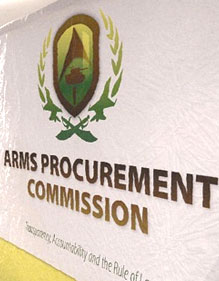|
Getting your Trinity Audio player ready...
|
 By Lee-Ann Alfreds
By Lee-Ann Alfreds
Gavin Woods epitomises the saying “when his country called, he answered”.
Fourteen years after his and co-chairman of Parliament’s Standing Committee on Public Accounts, Andrew Feinstein’s, harrowing attempts to discover the truth behind allegations of corruption in the arms deal, the former IFP member is once again trying to help uncover the truth. And in equally challenging circumstances.
Woods, now a commissioner with the Public Service Commission, took the stand on 2 September, at a time when the credibility of the Arms Procurement Commission – which is investigating allegations of fraud and corruption in South Africa’s controversial 1999 arms deal – is in question following the withdrawal of Feinstein and fellow critics Paul Holden and Hennie van Vuuren from the proceedings. The three announced at the end of August that they were withdrawing because they believed critics of the deal were being treated unfairly by the commission in its ruling regarding relying on evidence that they had not authored, and in the granting of access to documents, among other grievances.
Despite this, Woods – while acknowledging being “anxious” about his treatment on the stand – was determined to testify. “I share some of their (Feinstein, Holden and Van Vuuren) anxieties, but don’t feel it as deeply as they do,” he conceded. “Yes, I do have a degree of concern but for me I don’t know if there will ever be an opportunity to state my views on things.”
And Woods’ view on things is simple. His argument is that, based on circumstantial evidence, there is a “high probability that corruption took place”. He wants to present “the big framework” to the commission.
Flawed procurement processes
“The procurement processes were so riddled with flaws that there were huge opportunities for corruption and gaps in the system to be exploited. I provide a lot of circumstantial evidence to show there was opportunity. When interfaced with the allegations, some have proved to be nonsense, but some have substance. There has also been some documentary evidence from the international investigations that bribes were paid. It shows there is a remarkable fit between all the allegations and where the opportunity lay. I hope to convince the commission there probably was corruption,” he told Corruption Watch.
But Woods admitted that he didn’t know whether his argument would hold sway with a commission that has been accused of treating detractors harshly. “I have to do my best. I owe it to a lot of people who have faith in me.”
Plus, he acknowledged that “from our side (the critics) the people who have testified haven’t been too convincing”.
“Lots of people have been disappointed. We haven’t been too forthcoming. I feel responsible for restoring the situation and I’m hoping the commission tries to provide its credentials and it has integrity.”
Making amends for getting it wrong the first time
Woods conceded that he did not know undeniably that corruption did take place, which is why he was so grateful the Seriti Commission – as the Arms Procurement Commission is known – had been established to get to the truth. “If the commission is honest, exercises their mind correctly, is fair and they are going to do what South Africa expects of them and expects of a Commission of Inquiry, then I can live with it if it they find there was no arguments for corruption … as long as they do an honest job,” he insisted.
While Woods could not prove categorically the arms deal was riddled with fraud and corruption, he was unequivocal about the impact it has had. It has rendered public institutions, which are supposed to police government, virtually toothless.
“It was without doubt a critical moment for our new democracy and we failed. Scopa (which monitors how the government spends taxpayers’ money) had had people dismissed for corruption and when we called people before Scopa they were generally scared. We were exerting pressure on people to look after public funds better than they had ever been. But ever since then, the ANC has chosen their chairs very carefully. Scopa is now little more than just a production line. There are very seldom major issues. Now it all seems to slip under the radar,” he said.
And it is this very reason why Woods testified against the background of Feinstein’s withdrawal. “I had a responsibility (in 2000/01) to find out whether the deal had been honest and we were thwarted at every turn and given a difficult time. The original investigation wasn’t going to produce the truth or the facts.
“I’ve lived with some degree of regret that I failed as a chairman to do my job, to do what Scopa should have done, to exercise oversight of the deal. We were undermined on all sides … I regret that we (Scopa) couldn’t ever say to the public, ‘yes, we’ve really gone into this and there’s nothing there or there’s something there’.”








